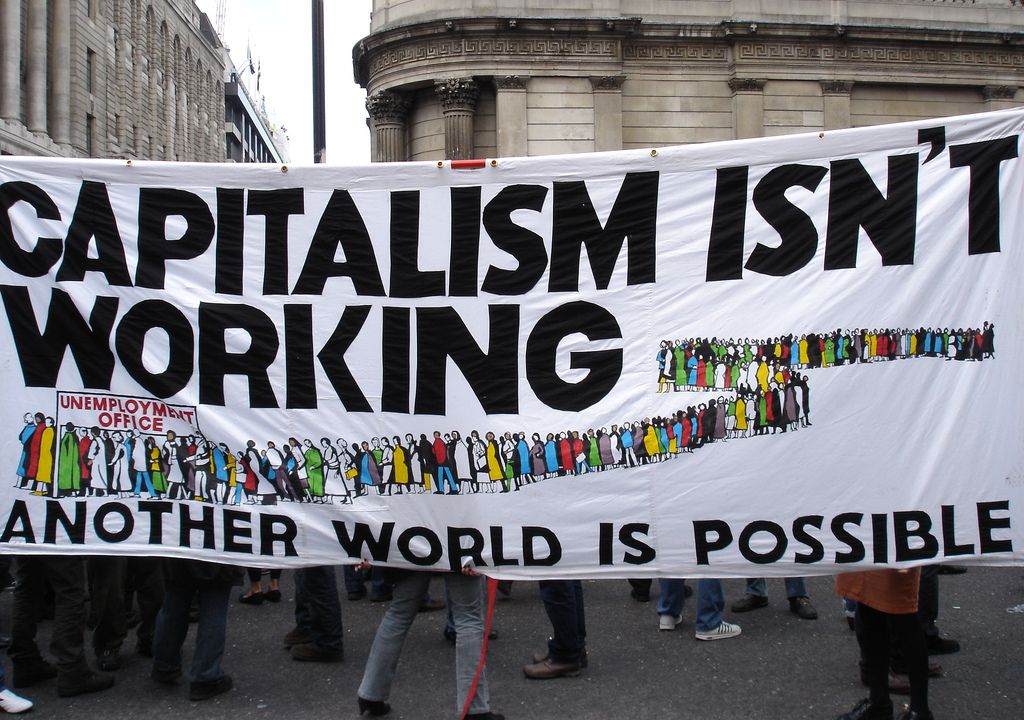
This Q&A is part of Sarah Jaffe’s series Interviews for Resistance, in which she speaks with organizers, troublemakers and thinkers who are doing the hard work of fighting back against America’s corporate and political powers. This interview has been edited for length and clarity.
Sarah Jaffe: I’m speaking with Jeff Ordower, executive director of Global Exchange. It is now August. That means we are in month eight of #Resistance. How do you think we are doing so far?
Jeff Ordower: We are not winning, obviously, but I think we are doing better than I would have anticipated. Obamacare still exists. Richard Cordray [at the Consumer Financial Protection Bureau] has not been fired yet. Even some smaller things around financial reform — the new arbitration rule from the Obama administration is going to stay in effect. That will give folks the right to sue, for example, Wells Fargo if they opened a fraudulent account and then used that money to sell you fraudulent auto insurance on that loan.
I think things are in some ways better than we could have imagined, and that is in large part thanks to the amazing work of the resistance. So many people have stepped forward who had not been active before. Smart organizers have figured out how to harness that energy. Whether that is bringing hundreds of people to a mass arrest or giving people a really solid program for saying, “If you are going to your congressperson’s office, here is how you create an alternative town hall” or “Here is how you bring a handwritten letter” so folks who are pretty new can be activated and do something that is really relevant. I think that is pretty inspiring.
That could all change momentarily if there is a terrorist attack or we pre-emptively invade somewhere. I think war changes the footing of everything, and unfortunately changes what is possible in terms of overall repression. From my perch as the director of Global Exchange, the other worrisome thing is that the shrinking of rights is just so possible. Around the world, there are so many templates for this, whether it’s a quasi-legal coup in Brazil or the president of the Philippines engaging in mass extrajudicial killings or Poland, where there are a lot of roots of Eastern European white supremacy, ignoring the courts.
Then, things on Wall Street are booming, the rich are getting richer and white supremacy and misogyny is running rampant. So, to say we are doing okay because we are not losing as much ground as we thought doesn’t change the material conditions if you are a person of color or a woman in this country.
SJ: Health care, obviously, took center stage for most of the last several month — ultimately, successfully. What are the lessons that you are taking from that, and what should everybody now pivot to?
JO: How we tell that story — who is affected, and having affected people take the biggest and boldest risk — being in the front is critical. I think a lot of times as organizers we sometimes fall into the trap where we want to have the perfect thing — the perfect narrative, the perfect story. I know in the early days of the health care fight, for example, people said, “If you want to move McCain, you have to get seven veterans to go to McCain’s office.” I think sometimes we try to be too strategic. Really, if people want to move, we have got to give them something to do that makes sense. Sometimes that is occupying a park or putting bodies on the line, and sometimes that is just “show up with a handwritten letter. Here is your toolkit for organizing this alternative town hall.”
SJ: Trump, very notably, ran criticizing Hillary Clinton’s Wall Street ties, Ted Cruz’s Wall Street ties, everybody’s Wall Street ties — but, as you said, Wall Street is making tons of money and they are all over the Trump administration. Is that a good place to put some of this energy now that health care is somewhat on the back burner?
JO: The pernicious effects of finance capital are apparent. You think about Goldman Sachs, that folks have been fighting them as “Government Sachs.” They would have been running the Clinton administration or the Trump administration. It is fascinating to think it is an organization that can accommodate such alumni as Stephen Bannon and Gary Cohn. There was a separate set of Goldman Sachs folks that would have gone into the Clinton administration.
Yes, it is the right place to send resources if you do your power research. It is an intersectional fight. I think we have to do a better job of getting folks to see that. People feel it in their gut, but it is less clear what they can do. This has worked well, for example, in solidarity with Standing Rock. There were hundreds of actions against Wells Fargo in big cities like in New York, Philadelphia and Seattle, which pulled their funds from Wells Fargo because of the financing behind the specific wrong. We need to just have harder-hitting campaigns, harder-hitting messaging. There is a nascent socialism that is emerging. The more we can name capitalism and finance capital as the enemy, the more folks are going to want to join that fight.
There have been campaigns around how we change particular aspects of corporate behavior. We need a different model for taking on corporate power, and we don’t really have that. Occupy was interesting because it told the story. I think the banks feared the message, but I don’t think they feared that the Occupy movement was going to take down the banks. We need something in between just telling the story and the sophisticated campaigns where we are trying to change a behavior. We need to have a fundamental conflict with the Blackstones, the Goldmans and the Wells Fargos of the world, but we don’t really have a good model for doing that — and that is the thing we have got to figure out.
SJ: We’re talking as the Democratic Socialists of America convention is happening. There are now 25,000 people who are saying capitalism is the problem. After your years of organizing in different places, what do you see is different in the way people are organizing themselves now?
JO: We are naming capitalism in a way that we haven’t before. It is exciting to see the next generation really, really talking about socialism, really talking about capitalism. I think it opens a lot more freewheeling conversation. Is basic income on the table? Is a livable wage on the table? Is a guaranteed right to housing? All of these things, I think, fit the world in which we want to live, and it is good that we are starting to get there.
Where 20 years ago, or 10 years ago even, people talking about feminist issues, people talking about structural racism or people talking about class didn’t intersect and didn’t talk to each other. Now I think what is exciting about this anti-capitalist moment is also a desire for the work to be much more intersectional.
We need three things. We need sophisticated campaign-style organizing. We need really electoral work with bite. I think we are underutilizing that. Then uprisings — people showed up and then they didn’t go home. Not all of them are going to work, because not all of anything in organizing works, but the resources that we spend on sophisticated campaign work vastly outweigh what we spend on really trying to create disruptions. I think it’s important that we really spend some resources and force some more conflicts.
But there is a fundamental question and it is about system change. I don’t know what that looks like. That is not just getting rid of Trump/Pence. That is a more fundamental change. Maybe that is changing our structure of government and how we work.
We can have upheaval and it can be like France, where neither of the major two parties are left in government, but what you have is a new party that is equally centrist and corporate. Or we can try to build a left project. How do you move sufficiently outside the existing system while still understanding that the things you do in the system really make a difference? Well, if we have 22 million people keep their health care, that makes a real difference. I think it is a trick of how we hold both, but at least we need to be thinking about both at the same time.
SJ: Excellent. How can people keep up with you and your work?
JO: Folks should check out www.globalexchange.org. It is probably the most substantive piece of the work that I am doing right now. Then, also, I am involved with a lot of other wonderful organizations including Rising Tide of North America, and Showing Up for Racial Justice and Jewish Voice for Peace. There is no absolute right answer. Hopefully, everyone will find the work that they want to do and get involved.
Interviews for Resistance is a project of Sarah Jaffe, with assistance from Laura Feuillebois and support from the Nation Institute. It is also available as a podcast on iTunes. Not to be reprinted without permission.




